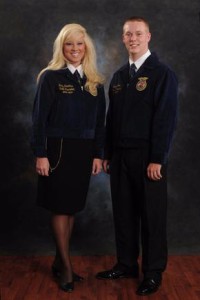What is FFA?
FFA stands for “Future Farmers of America.” FFA is a dynamic youth organization within agricultural education that prepares students with premier leadership, personal growth, and career success. FFA was created in 1928 by a Young group of Farmers it was then created to the “National FFA Organization” to represent the growing diversity of agriculture. Currently, nearly one half-million students members are engaged in a wide range of agricultural education activities, leading to over 300 career opportunities in the agricultural science, food, fiber and natural resources industry. Student success remains the primary mission of FFA.
How It Was Founded?
“Future Farmers of America” was founded by a group of young farmers back in 1928. Their mission was to prepare future generations for the challenges of feeding a growing population. They taught us that agriculture is more than planting and harvesting– it’s a science, it’s a business and it’s an art.
FFA continues to help the next generation rise up to meet those challenges by helping its members to develop their own unique talents and explore their interests in a broad range of career pathways.
So today, we are still the Future Farmers of America. But, we are the Future Biologists, Future Chemists, Future Veterinarians, Future Engineers and Future Entrepreneurs of America, too.
Our Structure
FFA is structured on three levels: local, state and national. At the national level, FFA is led by a board of directors and six student national officers.
More about FFA: ffa.org
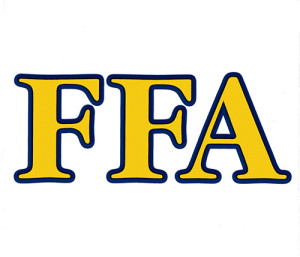 What Do The Letters “FFA” Stand For?
What Do The Letters “FFA” Stand For?
The letters “FFA” stand for Future Farmers of America. These letters are a part of our history and our heritage that will never change. But FFA is not just for students who want to be production farmers; FFA also welcomes members who aspire to careers as teachers, doctors, scientists, business owners and more. For this reason, the name of the organization was updated in 1988 after a vote of national convention delegates to reflect the growing diversity and new opportunities in the industry of agriculture.
Today, the National FFA Organization remains committed to the individual student, providing a path to achievement in premier leadership, personal growth and career success through agricultural education.
FFA continues to help the next generation rise up to meet those challenges by helping its members to develop their own unique talents and explore their interests in a broad range of agricultural career pathways. So today, we are still the Future Farmers of America. But, we are the Future Biologists, Future Chemists, Future Veterinarians, Future Engineers and Future Entrepreneurs of America, too.
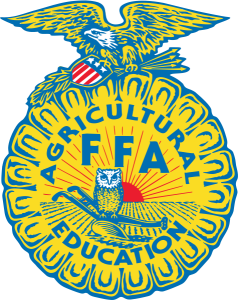 The FFA Emblem
The FFA Emblem
 The cross section of the ear of corn provides the foundation of the emblem, just as corn has historically served as the foundation crop of American agriculture. It is also a symbol of unity, as corn is grown in every state of the nation.
The cross section of the ear of corn provides the foundation of the emblem, just as corn has historically served as the foundation crop of American agriculture. It is also a symbol of unity, as corn is grown in every state of the nation.
The rising sun signifies progress and holds a promise that tomorrow will bring a new day glowing with opportunity.
The plow signifies labor and tillage of the soil, the backbone of agriculture and the historic foundation of our countries strength.
The eagle is a national symbol which serves as a reminder of our freedom and ability to explore new horizons for the future of agriculture.
 The owl, long recognized for its wisdom, symbolizes the knowledge required to be successful in the industry of agriculture
The owl, long recognized for its wisdom, symbolizes the knowledge required to be successful in the industry of agriculture
The words “Agricultural Education” and “FFA” are emblazoned in the center to signify the combination of learning and leadership necessary for progressive agriculture.
The FFA Creed
I believe in the future of agriculture, with a faith born not of words but of deeds – achievements won by the present and past generations of agriculturists; in the promise of better days through better ways, even as the better things we now enjoy have come to us from the struggles of former years.
I believe that to live and work on a good farm, or to be engaged in other agricultural pursuits, is pleasant as well as challenging; for I know the joys and discomforts of agricultural life and hold an inborn fondness for those associations which, even in hours of discouragement, I cannot deny.
I believe in leadership from ourselves and respect from others. I believe in my own ability to work efficiently and think clearly, with such knowledge and skill as I can secure, and in the ability of progressive agriculturists to serve our own and the public interest in producing and marketing the product of our toil.
I believe in less dependence on begging and more power in bargaining; in the life abundant and enough honest wealth to help make it so–for others as well as myself; in less need for charity and more of it when needed; in being happy myself and playing square with those whose happiness depends upon me.
I believe that American agriculture can and will hold true to the best traditions of our national life and that I can exert an influence in my home and community which will stand solid for my part in that inspiring task.
The creed was written by E.M. Tiffany and adopted at the Third National FFA Convention. It was revised at the 38th and 63rd Conventions.
Official Dress: FFA Uniform
The uniform worn by FFA members at local, state and national functions is called Official Dress. It provides identity and gives a distinctive and recognizable image to the organization and its members. Official Dress has been worn with pride by millions of FFA members since 1933.
The official FFA jacket was established by the delegates at the 1933 National FFA Convention. Official Dress standards traditions were created by the delegates at the 1973 national convention and most recently revised by the delegates at the 2002 National FFA Convention.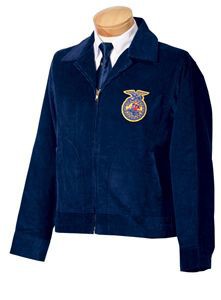
Official Dress for female members:
• Black skirt
• White collared blouse
• Official FFA blue scarf
• Black dress shoes with a closed heel and toe
• Black nylon hosiery (Nude Nylons Allowed for California Members.)
• An official FFA jacket zipped to the top
• Degree chain with State or American FFA Degree
Official Dress for male members:
• Black slacks
• White collared shirt
• Official FFA necktie
• Black dress shoes
• Black socks
• An official FFA jacket zipped to the top
• Degree chain with State or American FFA Degree
Degrees
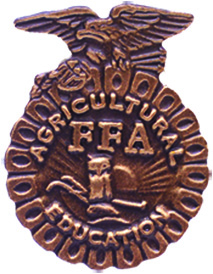 Greenhand Degree
Greenhand Degree
The California FFA Association Constitution outlines minimum qualifications for receiving the Greenhand FFA Degree. The greenhand degree is awarded at the chapter level.
ARTICLE IV. ACTIVE MEMBERSHIP DEGREES AND PRIVILEGES
Section B. Greenhand FFA Degree: On meeting the following minimum qualifications, the Greenhand FFA Degree may be conferred by the chapter:
- Be regularly enrolled in a vocational education course for an agricultural occupation and have satisfactory and acceptable plans for a program of supervised agricultural experience.
- Learn and explain the FFA Creed, Motto, Salute, and the FFA Mission Statement.
- Describe the FFA emblem, colors, and symbols.
- Explain the proper use of the FFA jacket.
- Have satisfactory knowledge of the history of the organization.
- Know the duties and responsibilities of FFA members.
- Personally own or have access to the Official FFA Manual.
- Submit written application for the degree for chapter records.
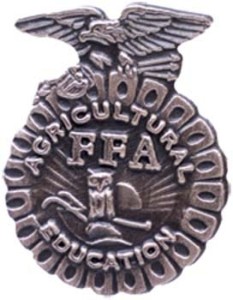 Chapter Degree
Chapter Degree
The California FFA Association Constitution outlines minimum qualifications for receiving the Chapter FFA Degree. The chapter FFA degree is awarded at the chapter level.
ARTICLE IV. ACTIVE MEMBERSHIP DEGREES AND PRIVILEGES
Section C. Chapter FFA Degree: On meeting the following minimum qualifications, the Chapter FFA Degree may be conferred by the chapter:
Must have held the degree of Greenhand for at least one complete semester of instruction and have a record of satisfactory participation in the activities of the local chapter.
- It shall be understood that conformance with the provisions of this article precludes a member from receiving both the Greenhand FFA and Chapter FFA Degrees during the same academic year.
- Must have satisfactorily completed at least one year of systematic instruction in agriculture education, at or above the ninth grade level, have in operation an approved supervised farming and/or other supervised agricultural experience program, have developed plans for continued growth and improvement in a supervised farming and/or other supervised agricultural experience program, and be regularly enrolled in an agriculture education class.
- Be familiar with the purposes and programs of activities of the state association and national organization.
- Be familiar with the provisions of the constitution of the local chapter.
- Be familiar with Parliamentary Procedure.
- Must have led a group discussion for fifteen minutes.
- Must have earned at least $150 by his/her own efforts from his/her supervised farming and/or other supervised agricultural experience program, and have it productively invested or deposited in a bank, or have worked 100 hours on his/her SOEP in excess of scheduled class time.
- Have a 2.0 scholastic record in an agricultural course.
- Participate in activities for community improvement as evidenced by participating in at least two distinctly different activities, to the extent of spending at least 10 hours of personal time, which you seek to serve and/or improve the quality of life in the local community.
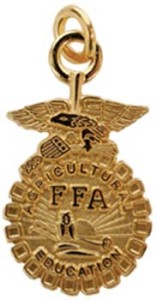 State Degree
State Degree
Overview
The State FFA Degree is awarded to FFA members who have demonstrated the highest level of commitment to the California State FFA Association and made significant accomplishments in their Supervised Agricultural Experiences (SAEs). Approximately 1,800 State FFA Degrees are handed out each year. That number represents approximately 3% of the Caifornia FFA association membership, making it the State’s highest honor. In addition to their degree, each recipient receives a gold State FFA Degree charm. The top State FFA Degree recipients may also apply for a Star Award.
Qualifications
ARTICLE IV. ACTIVE MEMBERSHIP DEGREES AND PRIVILEGES
Section D. State FFA Degree: To be eligible to be elected to the State FFA Degree a member must meet all of the following minimum qualifications:
- Must have held the Chapter FFA Degree for at least one year immediately preceding application for the State FFA Degree.
- Have been an active member of the FFA for at least two years preceding application for the State FFA Degree. At the time of application for the State FFA Degree, must have completed at least two years of instruction in agriculture education, at or above the ninth grade level, which included an agricultural. Supervised Agricultural Experience Program; and must be regularly enrolled in an agriculture education class at the secondary education level, an agriculture course at the post-secondary education level, or be a graduate of a secondary agriculture education program who is engaged in an agricultural occupation.
- Have worked for a minimum of 500 hours, in excess of scheduled class time, on his/her Supervised Agricultural Experience Program, and must have earned by his/her own efforts from an agricultural enterprise or other agriculturally-related work and deposited in a bank or otherwise productively invested at least $1,000.00; or show an investment cost of at least $2,000.00 in depreciable property inventory; or have earned by his/her own efforts from agricultural enterprise or other agriculturally-related work and deposited in a bank or otherwise productively invested a combination of dollars and unpaid labor hours which, when summed, equal at least $1,000.00. When qualifying based on a combination of dollars and hours, the hours counted for qualification must be unpaid labor hours of agriculturally-related work which are hours in excess of class time and which are hours over and above the minimum of 500 hours required in (4) above. Under no circumstances shall a member be qualified for the degree when qualifying based on a combination of dollars and hours without posting a minimum of $750.00 of earned and productively invested income
For the purposes of this subsection, productively invested is defined as any, all, or any combination of the following: amounts held in secured liquid financial investments, expenses paid for educational purposes, financial support of the immediate family, and/or that proportion of the purchase price of a motor vehicle which is equivalent to the proportion of the vehicle’s normal usage which is used for transportation to, from, or in the conduct of educational and/or SAE activities.
- Demonstrate leadership ability by:
- performing ten procedures of parliamentary law OR demonstrate proficiency in parliamentary law as evidenced by passing a written examination prepared and administered by the local agriculture instructor; giving a six-minute speech OR lead a group discussion for forty-minutes on a topic relating to agriculture or the FFA; serving as an officer, committee chairperson, or participating member of a committee; participating in at least five distinctly different FFA activities at the chapter level; participating in at least two distinctly different non-FFA school activities which are conducted outside of normal classtime; participating in activities for community improvement as evidenced by participating in at least two distinctly different activities, to the extent of spending at least 25 hours of personal time, which seek to serve and/or improve the quality of life in the local community; and being familiar with the provisions of the constitution of the State Association and National FFA Organization as certified by the local FFA advisor.
The scoring committee’s decision regarding a candidate’s worthiness may not be disputed or re-evaluated based on an applicant’s complaint that pertinent information was omitted and/or misstated on the application form.
A member who has received the State FFA Degree may apply for Star consideration at all levels provided he/she:
- Have a 2.0 scholastic record as certified by the local principal or superintendent.
- Have participated in the planning and completion of the Chapter Program of Activities.
- Have participated in at least five FFA activities above the chapter level.
- Written records of achievement, verified by the local advisor, shall be submitted to the state advisor by the local chapter’s governing body at least two months prior to the State Leadership Conference. These written records shall be based on the member’s own entries in the California Agricultural Education Record Book which is currently approved by the California state staff for Agricultural Education as the official recordbook for California Agricultural Education students. Such a record book is the only substantiation a member may use for the purpose of applying for advanced degrees and awards in this association. A committee appointed by the state advisor will then review the records and submit its findings to the state advisor, who will make his/her recommendations to the State Executive Committee. The Executive Committee will nominate and elect the candidates who have been found qualified to receive the degree. The state officers shall, at each region’s special awards program, raise to the State FFA Degree those candidates who have been elected by the State Executive Committee.
- The member’s Record Book entries must meet the verification process approved by the State FFA Advisor.
- It shall be the responsibility of the applicant, under the supervision of the local FFA advisor, to submit an application for the State FFA Degree which is thorough, complete, and accurate. Information which appears on the application form that is submitted to the State FFA office shall be the primary information which the scoring committee shall consider in its evaluation of the candidate’s worthiness for the degree. In the interest of providing maximum flexibility and fairness to all candidates, the regional supervisors of agriculture education shall be empowered under this section to make minor modifications to state degree application forms during the scoring and verification process.
- There shall be four annual awards for the State FFA Degree recipients known as the California Star Farmer, California Star in Agribusiness, California Star in Agricultural Placement, and the California Star in Agriscience. is a Junior, Senior, or first year Graduate, is an active FFA member in good standing at the time of application, and has an ongoing supervised occupational experience program which has been continuously under the supervision of the local agriculture instructor.Selection of the sectional and regional Stars will be selected in each region. The California Star finalist shall be based on the Regional Star Winners in each region. The California Stars will then be evaluated and decided on three criteria: FFA Record book Score, State FFA Star Application Score, and Interview Score.In any given year a student may only apply and be considered for Star honors under one Star category.An Honorary State FFA Degree may be awarded to any person performing an outstanding service to the FFA organization.
 American Degree
American Degree
Overview
The American FFA Degree is awarded to members who have demonstrated the highest level of commitment to FFA and made significant accomplishments in their supervised agricultural experiences (SAEs).
Qualifications
A student after entering agricultural education must have:
- Have received the State FFA Degree, have been an active member for the past three years (36 months) and have a record of satisfactory participation in the activities on the chapter and state level.
- Have satisfactorily completed the equivalent of at least three years (540 hours) of systematic secondary school instruction in an agricultural education program, or have completed at least the equivalent of 360 hours of systematic secondary school instruction in agricultural education and one full year of enrollment in a postsecondary agricultural program, or have completed the program of agricultural education offered in the secondary school last attended.
- Have graduated from high school at least 12 months prior to the national convention at which the degree is to be granted.
- Have in operation and have maintained records to substantiate an outstanding supervised agricultural experience program, through which the member has exhibited comprehensive planning and managerial and financial expertise.
A student after entering agricultural education must have: (a) Earned at least $10,000 and productively invested $7,500 or (b) Earned and productively invested $2,000 and worked 2,250 hours in excess of scheduled class time. Any combination of hours, times a factor of 3.56, plus actual dollars earned and productively invested must be equal to or greater than the number 10,000. Hours used for the purpose of producing earnings reported as productively invested income shall not be duplicated as hours of credit to meet the minimum requirements for the degree.
- Have a record of outstanding leadership abilities and community involvement and have achieved a high school scholastic record of “C” or better as certified by the principal or superintendent.
- Have participated in at least 50 hours of community service within at least three different community service activities. These hours are in addition to and cannot be duplicated as paid or unpaid supervised agricultural experience hours.
- Applicants must submit an application electronically through ffa.org. Applicants must submit the signature page with the signatures of the chapter president, chapter advisor, superintendent or principal, and state advisor or state executive secretary, certifying accuracy of all statements in the application and that the applicant conducted him/herself in a manner to be a credit to the organization, chapter and community.
How is FFA Funded?
FFA programs are funded through sponsorships and private donations at the local, state and national level. National dues for each member are $7 per year.
More information: ffa.org






